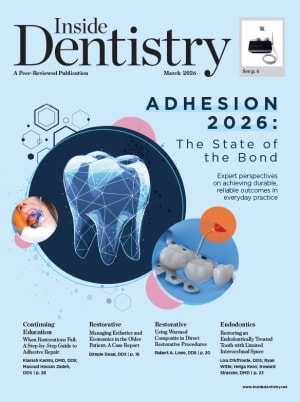Putting Patients at the Forefront
How AI is helping to foster patients’ trust and improve care delivery
Timothy Quirt, DDS, MBA, and Seth Gibree, DMD
Trust is foundational in healthcare, and it is a catalyst for strong patient-provider relationships. When patients trust their healthcare providers, they are more likely to communicate openly, accept recommended treatment, and adhere to treatment plans.
In recent years, artificial intelligence (AI) has emerged as a transformative force in various industries, and dentistry is no exception. By leveraging AI-powered technologies, dental practices can enhance patient care, streamline workflows, and foster trust between patients and providers. From improved diagnostic accuracy and enhanced patient communication to personalized treatment planning, AI is revolutionizing the way that dental care is delivered and placing patient experience at the forefront.
The Oral-Systemic Connection
The oral-systemic connection refers to the mechanisms by which conditions and diseases in the mouth can impact other areas of the body and vice versa. In support of this concept, numerous studies have found links between oral health conditions and various systemic conditions, such as cardiovascular disease, diabetes, respiratory infections, pregnancy complications, and even Alzheimer's disease. This underscores the importance of maintaining good oral hygiene-not only for a healthy mouth but also for overall well-being.
A December 2023 survey conducted by VideaHealth captured the thoughts and actions of US citizens regarding the connection between oral and overall health.1 Despite the fact that 94% of the 1,000 surveyed adults acknowledged the importance of the oral-systemic link, a notable 20% reported visiting the dentist less than once a year. Even when dental issues arise, many reported that they delay seeking professional help, citing cost (53%), fear (28%), and a perceived lack of urgency (18%) as primary deterrents. Fortunately, viable solutions exist to address these patient concerns.
The Value of Preventive Dentistry
Savvy dental clinicians know that the best dental care is the least amount of dental care, which is to say that preventive dentistry is the best path to great oral health. Preventive dentistry is crucial to maintaining patients' oral health as well as their overall well-being. Regular dental checkups help lower patients' risk of developing tooth decay, gum disease, and more serious dental problems. Furthermore, preventive dentistry is more cost-effective and helps reduce the financial burden of dental care over time. By investing in preventive measures, such as regular checkups, professional cleanings, and dental sealants, individuals can avoid the need for more extensive and costly treatments down the line.
Nonetheless, according to the VideaHealth survey, a significant portion of US citizens (31%) ignore dental problems entirely or only seek treatment when the pain is too great to endure. Even among individuals who report going to the dentist, a staggering 81% hesitate to commit to treatment suggested by their dentists, with almost half (44%) indicating that they have declined or delayed treatment in the past. Without a trusted provider-patient relationship in which the patients feel comfortable asking questions and the providers invest in educating their patients, the value of preventive dentistry is often misunderstood.
The Importance of Trust
The presence of trust in healthcare holds immense value for patients, providers, and their teams alike. Effective communication is a key component of this equation. Provider-patient relationships that are grounded in trust and effective communication help to create environments where patients' anxieties are alleviated, paving the way for enhanced confidence in recommendations and treatment acceptance.
As clinicians, we have experienced firsthand the impact of strong provider-patient relationships that are grounded in trust. Some of us have taken steps to help foster such relationships with our patients either on our own or through continuing education opportunities. For example, as a doctor-led organization and support model, Heartland Dental offers access to continuing education focused on fostering strong provider-patient relationships through Heartland Dental University.
The Role of AI in Dentistry
Over the years, technologies such as digital scanners have helped to enhance patient communications in dentistry. Digital scanners provide a visual representation of a patient's oral structures in high definition. These images can act as a visual aid to enhance patients' understanding of their oral health. Dental AI takes this imaging to the next level by clearly highlighting any areas of potential concern to facilitate clear communication about patients' oral health. Increasingly, AI is being incorporated into a variety of dental technologies to provide clinical decision-making support, assist with practice management, and more. Although AI holds the potential to help dentists revolutionize dentistry by optimizing patient care through technology and clinical innovation, improving diagnostic accuracy, enhancing communication, and streamlining workflows, its implementation must be ethical and responsible while prioritizing patient safety, privacy, and autonomy.
Dental AI is becoming more and more prevalent in practices as well as more accepted by dental patients. A majority of the respondents to the VideaHealth survey (53%) indicated that they were open to the use of AI in dentistry, and even more (59%) indicated that they were open to the use of dental AI if it helped catch issues early or reduced the need for future invasive treatment. Regarding the top three deterrents for dental care-cost (53%), fear (28%), and a perceived lack of urgency (18%)-AI-powered dental technologies can help providers and patients to better manage these concerns. From improved diagnostic accuracy and enhanced patient communication to personalized treatment planning, AI-powered technologies are reshaping the way that oral healthcare is delivered and, ultimately, helping to place patients at the center of the experience. By embracing AI and harnessing its potential to enhance patient care and strengthen patient-provider relationships, going forward, dental practices can continue to provide patients with the highest quality care and empower them to feel confident in their individual oral healthcare journeys.
About the Authors
Timothy Quirt, DDS, MBA, is the senior vice president of clinical operations for Heartland Dental.
Seth Gibree, DMD, is a fellow of the Academy of General Dentistry and the senior director of clinical AI and innovation for Heartland Dental.
